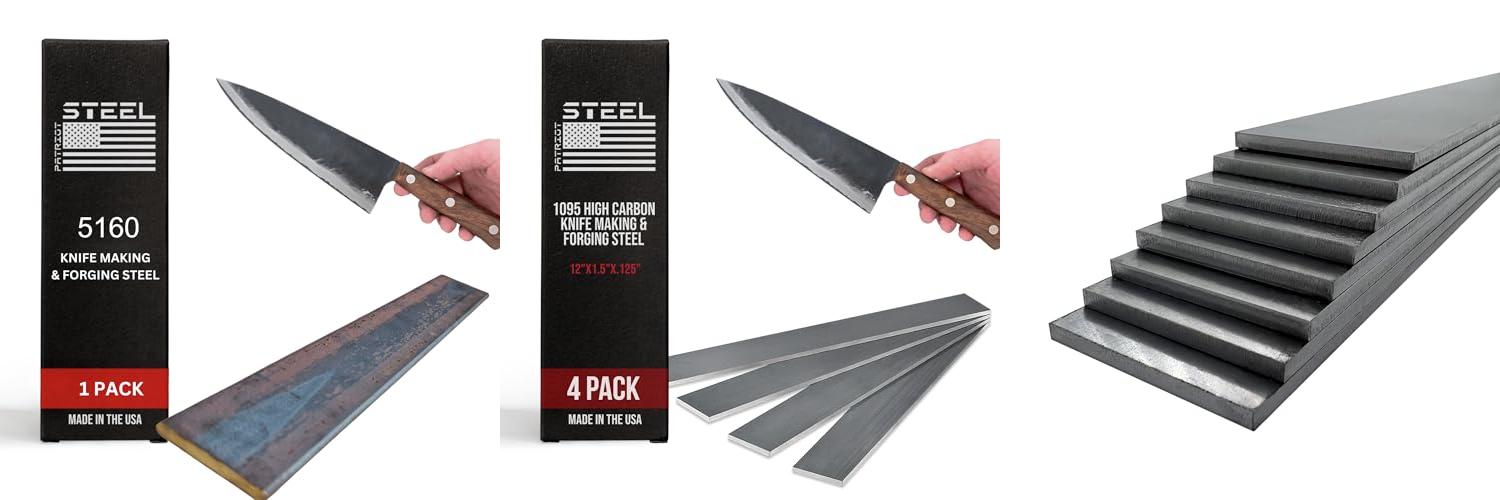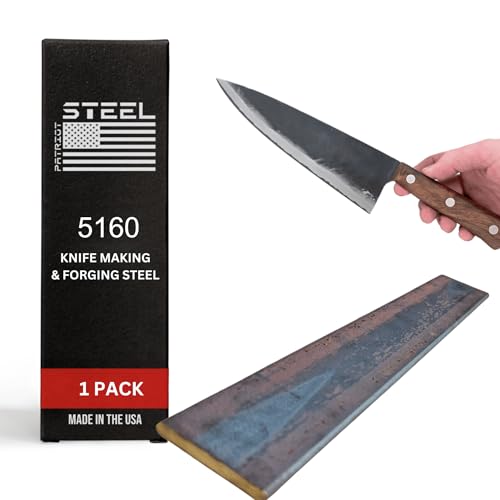Ever wonder what makes a good knife? It’s not just the sharp edge, but the metal it’s made from. Picking the right steel for forging a knife can feel like navigating a maze. So many types exist, and each has its own strengths and weaknesses. It’s easy to get lost in all the technical jargon!
Choosing the wrong steel can lead to a knife that’s too brittle, won’t hold an edge, or even rusts easily. This can be frustrating, especially after putting in all the hard work of forging. You want a knife that performs well and lasts a long time, right?
In this post, we’ll cut through the confusion. We’ll explore the different kinds of steel used for knife forging and explain what makes them special. By the end, you’ll have a clearer picture and feel more confident in choosing the perfect steel for your next knife project. Let’s dive in and discover the secrets behind great knife steel!
Our Top 5 Knife Forging Steel Recommendations at a Glance
Top 5 Knife Forging Steel Detailed Reviews
1. Patriot Steel 5160 High Carbon Knife Making & Forging Steel – Hot Rolled Steel for Knife Making Supplies – USA-Milled Excellence for Pros & Hobbyists -1.25″ wide
Rating: 8.6/10
Are you looking for top-notch steel to craft your next knife? Patriot Steel 5160 High Carbon Knife Making & Forging Steel is a fantastic choice for anyone who loves making knives, whether you’re a seasoned pro or just starting out. This hot-rolled steel is milled right here in the USA, meaning you get excellent quality. It’s a reliable material that will help you create durable and sharp blades.
What We Like:
- Consistent Quality: Patriot Steel makes their steel in small batches. This means they can check every piece carefully. You get a high-quality product you can count on every time.
- Made in the USA: The steel is milled in the United States. This ensures it meets strict quality standards. You’re supporting American manufacturing with this purchase.
- Hand-Inspected: Each order is packed by hand. This extra step guarantees that the quality and consistency you expect are delivered.
- Great for All Skill Levels: This steel is perfect for both experienced knife makers and hobbyists. It’s a versatile material that works well for many projects.
What Could Be Improved:
- Limited Availability: Because they focus on small batches and careful inspection, availability can sometimes be limited. Planning ahead is a good idea.
Patriot Steel 5160 offers dependable quality for your knife-making projects. You can trust this USA-milled steel to help you create amazing knives.
2. Patriot Steel 1095 High Carbon Knife Making & Forging Steel – Cold Rolled Annealed Flat Bars & Blanks – Knifemakers
Rating: 8.7/10
Unleash your inner bladesmith with Patriot Steel’s 1095 High Carbon Knife Making & Forging Steel. This pack of four 12″x1.5″x.125″ cold-rolled annealed flat bars is made in the USA. It’s perfect for anyone who loves to forge or make knives, from beginners to seasoned pros. You can start forging right away because the steel is already annealed, saving you time and effort. This makes shaping your blades easier and protects your sanding belts.
-
What We Like:
- USA-milled 1095 high carbon steel ensures quality and consistency for all your forging and heat-treating needs.
- Cold-rolled and annealed blanks mean less prep work, letting you focus on creating your masterpiece.
- This steel is great for making custom knives, power knives, or even your first blade.
- You get uniform dimensions and reliable hardness every time, making it a trustworthy material for your toolkit.
- Patriot Steel is a dependable source for knifemakers, offering American-made quality.
-
What Could Be Improved:
- The 12-inch length might be limiting for some larger knife projects.
- While annealed, the steel will still require significant shaping and heat treatment to achieve a final blade.
This Patriot Steel offers a fantastic starting point for your knife-making adventures. It’s a reliable material that helps you create quality blades with ease.
3. 8-Pack 1084 High Carbon Steel Blanks 12″x1.5″x0.12″ for Knife Making – Professional Forging Steel with Anti-Rust Coating
Rating: 9.1/10
Unleash your inner bladesmith with this 8-Pack of 1084 High Carbon Steel Blanks. These 12″x1.5″x0.12″ steel pieces are ready for your creative touch, whether you’re forging classic Damascus patterns or crafting robust full tang knives. They come with a special anti-rust coating, so they arrive in perfect condition.
What We Like:
- The precise laser-cut size maximizes the material you get.
- You can make matching knives or try different sharpening styles.
- 1084 steel is great for both keeping an edge and working with.
- It’s perfect for making knives with cool wavy patterns, like Japanese Tanto or Viking Hex knives.
- You can easily combine these with 15N20 steel to create beautiful Damascus patterns with many layers.
- The thin profile works well for stacking with Damascus designs without making the knife too thick.
- They are protected by four layers of packaging to stop rust and damage.
- Professional knife makers trust these blanks.
What Could Be Improved:
- While great for many projects, 1084 steel might not hold an edge quite as long as some other steels like 1095.
- The specific dimensions, while precise, might limit very niche or extremely large knife designs.
These steel blanks offer a fantastic starting point for serious knife makers. With their quality and versatility, you can create truly impressive blades.
4. 1095 Steel Flat Stock for Knife Making-Annealed High Carbon Steel
Rating: 9.3/10
Get ready to craft your next masterpiece with this 1095 Steel Flat Stock! This pack comes with four 12-inch by 1.5-inch by 0.12-inch pieces of high-carbon steel, perfect for knife making and other DIY projects. The steel is cold-rolled and annealed, which makes it easier to work with and saves you time on sanding.
What We Like:
- Excellent material for making blades: 1095 steel is the highest carbon grade, giving you great results when you heat treat it.
- Ready to use: The steel is annealed, making it softer and easier to grind and shape.
- Built tough and easy to grind: This steel offers super toughness and grinds well, ideal for hand-making blades, knives, and tools.
- Protective packaging: Each pack is carefully wrapped in three layers to prevent rust and damage during shipping.
- Great value: You get four pieces of quality steel for your projects.
What Could Be Improved:
- Not pre-sharpened: You’ll need to do all the sharpening yourself.
- Requires specific tools: Working with steel requires certain tools and knowledge of metalworking.
This 1095 steel flat stock is a fantastic choice for anyone looking to create their own knives or tools. Its quality and ease of use make it a top pick for DIY enthusiasts.
5. SALUINOKI 10Pack 15N20 Steel Flat Stock 4″x2″x1/8″ Damascus Steel Knife Blanks for Knife Making Forging Steel Forge Metal for Blacksmithing
Rating: 8.8/10
The SALUINOKI 10Pack of 15N20 Steel Flat Stock offers a great starting point for anyone looking to craft their own Damascus steel knives. These 4″x2″x1/8″ blanks are designed for knife making and forging, providing a solid foundation for your projects. This pack gives you ten pieces of steel, which is a good amount to practice with or to create multiple knives.
What We Like:
- You get 10 pieces of 15N20 steel, which is a good value for the price.
- The size of the blanks (4″x2″x1/8″) is convenient for many knife designs.
- SALUINOKI takes care to protect the steel. It comes with rust-proof oil, rust-proof paper, a bubble bag, and a cardboard box to keep it safe during shipping.
- These blanks are a good choice for making Damascus knives.
What Could Be Improved:
- The steel is not suitable for acid etching to create decorative patterns. This is important to know if you want fancy designs on your finished knife.
This SALUINOKI 15N20 steel pack is a solid option for aspiring blacksmiths and knife makers. Just remember its limitation if you plan on decorative etching.
Choosing the Right Steel for Your Knife Forge
Are you looking to forge your own knives? Picking the right steel is super important. It affects how well your knife cuts, how sharp it stays, and how tough it is. This guide will help you choose the best knife forging steel for your projects.
Key Features to Look For
When you’re shopping for knife forging steel, keep these things in mind:
- Hardness: This is how well the steel resists scratching and wear. Harder steel holds an edge longer.
- Toughness: This means the steel can handle impacts without breaking or chipping. You want a balance of hardness and toughness.
- Edge Retention: This is how long your knife’s edge stays sharp with use. High carbon steels usually have good edge retention.
- Corrosion Resistance: Some steels rust more easily than others. Stainless steels are best if you don’t want rust.
Important Materials in Knife Steel
Knife steels are made of iron mixed with other elements. These additions change the steel’s properties.
- Carbon: This is the most important element for making steel hard. More carbon usually means a harder steel that can hold a sharp edge.
- Chromium: When added in amounts of 13% or more, chromium makes steel “stainless.” It helps prevent rust.
- Vanadium: This element makes the steel harder and improves its wear resistance. It helps create fine grains in the steel.
- Molybdenum: Molybdenum helps steel stay tough at high temperatures. It also improves strength and hardness.
- Nickel: Nickel can improve toughness and help prevent corrosion.
Factors That Improve or Reduce Quality
Not all steel is created equal. Here’s what makes a difference:
- Heat Treatment: This is a crucial step. Proper heating and cooling make the steel strong and tough. If done wrong, the steel can be brittle or soft.
- Grain Structure: The tiny grains inside the steel affect its strength. A fine, even grain structure is usually better.
- Manufacturing Process: How the steel is made matters. High-quality manufacturing leads to cleaner steel with fewer impurities. Impurities can weaken the steel.
- Alloy Composition: The exact mix of elements is key. Too much or too little of an element can hurt performance.
User Experience and Use Cases
The best steel for you depends on what you plan to do with your knives.
- Everyday Carry (EDC) Knives: You need a good balance of sharpness, toughness, and corrosion resistance. Steels like 1084 or D2 are popular choices.
- Kitchen Knives: Sharpness and ease of sharpening are important. Many stainless steels work well here, like 440C or VG-10.
- Outdoor/Survival Knives: These need to be tough and able to handle rough use. High carbon steels like 5160 or O1 are often used. They can take a beating.
- Collecting Knives: Some makers prefer steels that are easier to work with for intricate designs or that have unique properties.
Common Knife Forging Steels**
Here are some steels you’ll often see:
* **1080/1084:** These are simple carbon steels. They are easy to forge and heat treat. They make good knives for beginners.
* **5160:** This is a spring steel. It’s very tough and can handle abuse. It’s great for knives that need to be durable.
* **D2:** This is a tool steel. It’s very hard and holds an edge well. It’s a bit harder to work with than simpler steels.
* **154CM/ATS-34:** These are stainless steels. They offer good hardness and edge retention. They are a step up from basic stainless steels.
Choosing the right knife forging steel is an important part of making a great knife. Think about what you want your knife to do, and pick a steel that fits those needs. Happy forging!
—
Frequently Asked Questions (FAQ)
Q: What is the most important thing to consider when buying knife forging steel?
A: The most important thing is to match the steel’s properties to how you plan to use your knife.
Q: Is high carbon steel or stainless steel better for forging?
A: High carbon steels are generally easier to forge and heat treat. Stainless steels offer better rust resistance but can be trickier to work with.
Q: What steel is good for a beginner who is just starting to forge knives?
A: Steels like 1084 or 1080 are excellent for beginners because they are forgiving during forging and heat treating.
Q: How does heat treatment affect the quality of knife steel?
A: Proper heat treatment is essential. It makes the steel hard and tough. Incorrect heat treatment can ruin the steel.
Q: Can I use any steel to forge a knife?
A: While you can technically forge many steels, not all of them will make good knives. You need steels designed for cutting edges and toughness.
Q: What does “edge retention” mean for a knife?
A: Edge retention is how long a knife’s edge stays sharp during use before needing to be sharpened again.
Q: Why is chromium important in knife steel?
A: Chromium, when added in enough amounts, makes the steel resistant to rust, which is why it’s called “stainless steel.”
Q: Is it better to have harder steel or tougher steel for a knife?
A: A good knife needs a balance of both. Very hard steel can be brittle and chip easily. Tough steel can bend without breaking.
Q: What are some common problems with low-quality knife steel?
A: Low-quality steel might have impurities that weaken it, inconsistent hardness, or poor grain structure, leading to a knife that chips or breaks easily.
Q: Where can I buy good knife forging steel?
A: You can buy knife forging steel from specialty metal suppliers, online knife-making supply stores, and sometimes from blacksmithing supply companies.
In conclusion, every product has unique features and benefits. We hope this review helps you decide if it meets your needs. An informed choice ensures the best experience.
If you have any questions or feedback, please share them in the comments. Your input helps everyone. Thank you for reading.






